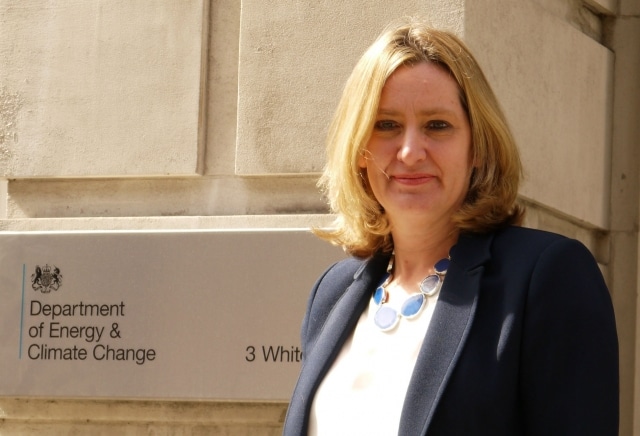This is Part 3 in our Amber Rudd series where DeSmog UK looks at her close ties to George Osborne. Read Part 2 here.
Observers disagree about whether energy and climate secretary Amber Rudd is a ‘Turquoise Tory’, a conservative with a small ‘c’, or whether in fact she is merely a career politician serving the powerful. Will she stand on principle in Paris, or quietly toe the corporate line?
There are important clues to be found from her life story. Part three of this story explores the relationship between Rudd and George Osborne
Osborne’s Ally
In September 2012, Rudd became a parliamentary aide to Chancellor George Osborne – a position that many saw as instrumental in her career in government. A year later she was appointed assistant whip to the Treasury shortly before entering the Department for Energy and Climate Change (DECC).
Rudd is frequently described as a key ally of Osborne: his ‘right-hand woman’. Should Osborne decide to run as prime minister in five years, many believe Rudd would be slated for a top position under his leadership.
Indeed, the two recently travelled to China together to court nuclear investors ahead of sealing the deal on the controversial Hinkley nuclear plant early last month.
Rudd has certainly been towing the same line as Osborne when it comes to energy policy since she became head of DECC last May. But how did this all come about?
Steady Advance
Her appointment as the new parliamentary private secretary (PPS) to Osborne in 2012 was the first indicator that she was headed for greener pastures. A PPS position is often seen as a stepping stone towards a junior minister or cabinet post.
Then, during the October 2013 reshuffle, Rudd was promoted to junior whip. As the media reported at the time, the theme of this reshuffle was the “steady advance” of Osborne’s allies. As the Financial Times wrote: “The spectacle of Mr Osborne’s acolytes rising through the ranks reinforced the view of many Tory MPs that their only route to promotion is by befriending the chancellor.”
It certainly wasn’t long before Rudd was promoted to parliamentary under-secretary at DECC along with another Osborne ally, Matthew Hancock. This move gave rise to the suspicion that “the Treasury is seeking to tighten its grip on green energy spending” as the Telegraph wrote.
Indeed, Rudd’s and Hancock’s appointments were seen as evidence of the Treasury’s ever-growing influence over DECC – a theme that continues to this day. The two entered the department after it was heavily criticised by the National Audit Office for spending too much on subsidising new renewable electricity projects.
As Peter Atherton, utilities analyst at Liberum Capital, told the Telegraph at the time: “There is likely to be a suspicion that these two appointments represent a move by Mr Osborne to place his supporters into a key ministry. Mr Osborne has raised concerns over the pace of the decarbonisation agenda and the resulting costs.”
Climate and Fracking
Rudd’s promotion also served to bolster her climate credentials ahead of the 2015 general election. She was even set to attend the Lima climate talks last December before she was told by her own party not to attend.
During her time as a junior energy minister, Rudd was also tasked with steering fracking proposals through the Commons in the final months of the last parliament, albeit with mixed results.
This reflects orders given by Osborne in a letter to high-level cabinet members, including then head of DECC Ed Davey, to fast-track fracking as a “personal priority”. This included delivering numerous “asks” from shale gas company Cuadrilla.
And as we’ve seen in recent months, Rudd continues to follow Osborne’s orders to this day. Renewable energy subsidies, jobs and budgets have all been slashed at DECC under a Treasury clampdown on spending.
As one industry insider told the Financial Times: “She is nervous of doing anything that the chancellor will not approve of. This is a Treasury energy policy. Osborne’s priorities are fracking for gas and building nuclear power stations.”
Stay tuned for Part 4 where DeSmog UK explores Rudd’s time as secretary of state and her stance on climate change in the run up to the Paris climate conference.
Subscribe to our newsletter
Stay up to date with DeSmog news and alerts






